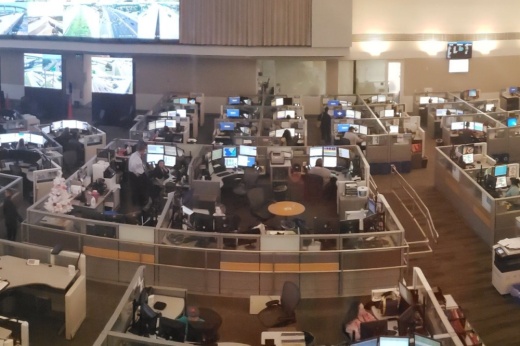During an Oct. 25 briefing to Austin City Council, Police Chief Joseph Chacon called the dwindling staff at the Austin Police Department's 911 call center a "concerning" situation that he and other city department heads have prioritized given the lag many Austinites are now experiencing when calling 911. The national standard for answering 90% of 911 calls is within 15 seconds, well below Austin's 150-second average. Chacon said APD hits that 15-second mark less than 66% of the time, leaving thousands more 911 callers on hold for much longer.
Staffing and call-taking trends led APD to pursue what Chacon labeled as "unconventional measures" to man the city's emergency phone lines and prompted several council members to call for the briefing as APD continues to focus on recruitment.
“With the vacancies at the rate that the chief told us about, and the answer rate far below the standard for 911 calls, and an average hold time for callers to be at 150 seconds, we’re in a crisis," District 6 Council Member Mackenzie Kelly said.
Staffing up
While noting that understaffing is an issue in all Austin departments—and across the country—Chacon said the city and APD are focused on what they can do differently at a local level to attract and retain call-takers. Among the issues he pointed to in Austin's communications center are compensation, burnout, turnover, a heightened workload with mandatory overtime, and the overall stress of a job fielding emergency calls.
To address those challenges, APD is focusing both on attracting new recruits and keeping its more tenured staff in place.
Changes already implemented include 26% and 35% increases to entry-level pay for call takers and police dispatchers, respectively. Licensed employees also receive a $150 monthly stipend, while all staff members who worked for the city as of mid-May are in line for a $3,000 retention bonus.
Police and human resources staff are exploring the possibility of additional sign-on bonuses, and they plan to address pay compression to better compensate long-serving employees as well as new hires this year.
Those shifts have already brought results, Chacon said. In the past 6 weeks, Chacon said APD brought on more call center staff—three new call-takers and two new dispatchers are already on the job, with two more dispatchers in training—than it had through the rest of 2022.
Within the department, Chacon said call-taker overtime requirements have been cut back, and current APD employees are also being trained to fill in as call-takers and dispatchers to plug existing gaps. Call center jobs are being promoted through police department recruiting booths and advertising, and the career path is also being offered to police cadets who do not make it through APD's training academy.
Further review
While stating their support for the hiring efforts and continued scrutiny of the issue, several officials also said the task of filling the 911 call center ultimately falls to City Manager Spencer Cronk. Council members throughout the meeting expressed frustration with Cronk and city management for staffing reaching its current level.
“You need to do whatever it is that you need to do," Mayor Steve Adler said. "From my seat here I’ll continue to send you suggestions, but at the end of the day you’re the one that's held responsible so you need to do whatever it takes to fix that, because it’s not fixed now.”
Adler later requested that a written report on any short-term staffing progress be shared with Council before Thanksgiving, and District 9 Council Member Kathie Tovo asked for a detailed breakdown of how the call center went from a relatively full staff just a few years ago to its current level.
Cronk said he and other city staff members will continue to pursue creative solutions to the issue beyond those already in motion. Those could potentially include a focus on the city's development of more affordable workforce housing for employees, including its police officers and civilian staffers—something Austin ISD is also looking into. He said updates to city leaders will continue as the process continues.
“We obviously take this very seriously, and you have my full commitment that we are doing everything we can to address the ... immediate challenge and the long-term challenges that we’ve seen in our emergency communications area," he said.
Human Resources Director Joya Hayes also committed to more transparency and communication between staff and Council as further changes are made amid what she said has been an unprecedented handful of years for hiring and staffing nationwide.
“This is a crisis, but our city is doing better, and we are trying to do more," Hayes said.





